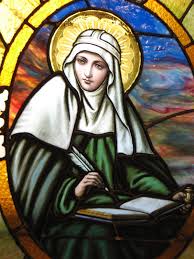HOMILY WEEK 16 04 – Year II
Humble Faith – Secret to the Kingdom:
Optional Memorial of St. Bridget of Sweden
(Jer 2:1-13; Ps 36; Mt 13:10-17)
********************************************
Are you trying to get to heaven, or already living in the kingdom of God?
The readings today invite us to have a humble faith in Jesus allowing us to experience the kingdom of heaven here and now.
The prophet Isaiah in the first reading provides an Old Testament background to the paradoxical and enigmatic language of Jesus in the gospel about the kingdom of God. We know the Chosen People were liberated from slavery in Egypt, given the Decalogue, land, temple, prophets, judges and invited to walk in an intimate covenant relationship with God.
Unfortunately, they fell short in their response to this divine intervention in their lives. According to Isaiah, they committed two sins – forsaking God and digging cisterns for themselves. Basically, they committed idolatry, worshipping the false gods of possession, prestige and power, as well as the sin of self-sufficiency, relying on their own efforts to save themselves, and not really trusting in God’s providence.
Things had not changed much in the time of Jesus. The people he encountered saw him but didn’t believe in him. Looking but not truly seeing, and hearing but not truly understanding, they questioned the validity of his miracles, accused him of being in league with Satan, and were scandalized when he said, “Whoever eats my flesh and drinks my blood has eternal live” (John 6:54). So, Jesus had to resort to speaking in parables designed to prod them into deeper reflection, and the paradoxical, mystical language of the secret of the kingdom, such as “looking without seeing and hearing without understanding.”
The statement of Jesus about those who have being given more, and those who have nothing being taken away, has always puzzled me. The most enlightening explanation comes from Ron Rolheiser, OMI, who asserts this is about our longing and desire for God. Those who have that longing and desire will find it strengthened, while those who lack that desire will find even that turning into a negative factor of resistance and bitterness.
Would it be any different if Jesus were to come today as he did two thousand years ago? According to The Word Among Us, it is not hard to imagine what could happen. His words would be misinterpreted. He would be called too liberal or too conservative. People might say that he’s a magician or that videos of his miracles were hoaxes and the result of computer manipulation. In short, Jesus would likely be as misunderstood today as he was in his own time. The made-for-TV movie series Messiah offers a fascinating depiction of what that might be like, complete with social media controversy of who this Messiah was.
In the gospel Jesus speaks of the secrets of the kingdom. I believe he alludes to one of them with his comment, “so that they might look … listen … understand with their heart and turn – and I would heal them.” As the Messiah, Jesus came to redeem and sanctify, to forgive and heal. So, one secret to experiencing the kingdom of heaven here and now is to come to him for forgiveness of all our sins, and healing of all our painful emotions and negative attitudes.
Another secret, I believe, is to accept redemptive suffering in our lives as he did, without bitterness or resentment. It is to “get” the mystery of the cross, to see it as a blessing in our own lives. When we can especially forgive others as Jesus did on the cross, and find meaning and purpose in our suffering, then we are already in the kingdom of God, and can claim the peace and joy and justice of that kingdom.
Psalm 36 puts us on the right path, reminding us that God is the source of life, steadfast in love, the fountain of life, full of steadfast love, and offering salvation to the upright of heart and to those, I believe, who humbly put their faith in Jesus as the Messiah, Son of God and Risen Lord.

St Bridget of Sweden
Today the Church honors someone who can serve as an example for us, St Bridget. She was born in Sweden in 1303. Her father was governor of the main province of Sweden and her mother was the daughter of a governor. Throughout her life, Bridget received visions and dreams and possessed gifts of prophecy and healing. After her mother’s death in 1314, Bridget lived with an aunt. She married at 13, bore eight children and lived happily until her husband’s death in 1344. After his death, Bridget moved near a Cistercian monastery, where she lived a penitential life. Seeking papal approval to create a new religious community, she moved to Rome and lived a life of prayer and penitence there for nearly 20 years. She founded the Bridgettine Order in 1370. Originally it included both men and women, but today is for women only. Bridget died in 1373, while returning to Rome from a pilgrimage to the Holy Land. She is patron of Sweden and co-patron of Europe, with St. Benedict, St. Catherine of Sienna and St. Teresa Benedicta of the Cross.
The Eucharist is a foretaste of the eternal banquet we will celebrate in fullness someday with God, and an experience of that steadfast love of God as forgiveness and healing. May our celebration strengthen our faith in God’s love for us, and deepen our experience of the kingdom of heaven in our lives here and now.



